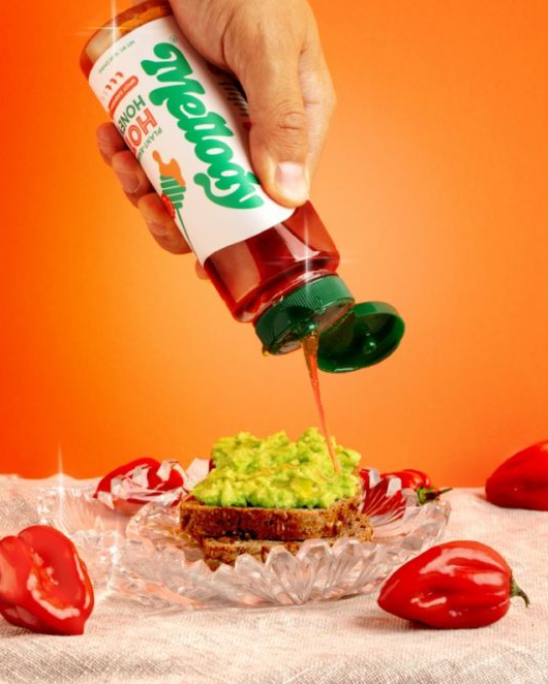
Formulating honey without the honey bee is now possible, thanks to Mellody Foods. The plant-based honey brand was launched in 2023 by Darko Mandich and Aaron M. Schaller from its parent company, MeliBio.
Mandich and Schaller wanted to create a brand that “gave honey bees a break.”
“I used to work for honey companies that relied on honey bees for manufacturing,” Mandich said. “Anytime anyone consumes a spoonful of our honey is having a heroic moment contributing to saving bee biodiversity.”
MeliBio, which was founded in 2020, is a food technology company that produces plant-based honey for restaurants and food companies. The company underwent three years of R&D until it scaled — resulting in Mellody Foods.
“Our honey made without bees has been created through a proprietary process using plants, food science and microbial fermentation technology developed in-house, and it has a long sugary component that we were able to extract from plants to get it to the honey,” Mandich said. “We take the same plants that the bees in nature would visit and turn them into honey. It’s a process that can be done all year round, whereas bees in nature can only manufacture certain periods of the year.”
MeliBio has its own R&D center in Oakland, Calif., which serves small-scale and piloting functions. The company works with an outside co-manufacturer, which is able to produce 10,000 lbs. per day.
“This is a medium-size capacity in the honey manufacturing world, which is interesting because we’ve only been here for four years,” Mandich said. “Our experienced team of food tech experts scaled up so quickly due to our CapEx-free approach in which we rely on external co-manufacturers instead of building our own facilities. With our approach, we have proven that food tech can be done on a budget.”
Mellody Foods currently carries two varieties of its plant-based honey in golden clover and spicy habanero.
The plant-based honey has struck a chord with the foodservice industry, creating happy chefs after they taste test the product, Mandich said.
“Seeing some of their faces after they try a spoonful of our honey is amazing,” he said. “Some chefs operate under plant-based guidelines and are not able to use premade honey. Very often they go with agave or maple; we learned from them that agave and maple don’t have the feel and taste they wanted to create.”
Chefs also have told the founders the plant-based honey offers floral notes with the initial kick and aftertaste of honey.
“You can’t tell the difference between our honey and original honey,” Mandich said. “It’s even better in some applications. You’re not compromising by using our honey. Customers are using it during breakfast, on salad bowls, sandwiches or pizza.”
One differentiator between Mellody’s honey and original honey is its label is “more inclusive for consumers.”
“With honey coming from the bees, there is a warning on the label that kids of certain ages can’t consume it. We do not have that on our label,” he said. “People who have allergies to pollen can sometimes be triggered with original honey. Our product is neutral toward pollen allergies.”
After finding success in the foodservice industry, Mellody Foods has plans to expand to wherever honey and sweeteners are found.
“We want to offer the best possible alternative that exists in this market,” Mandich said. “We plan to grow in foodservice, retail and business-to-business. Our focus now is to scale distribution so that we partner with companies that can take our products in many places.”
Article Credit: foodbusinessnews